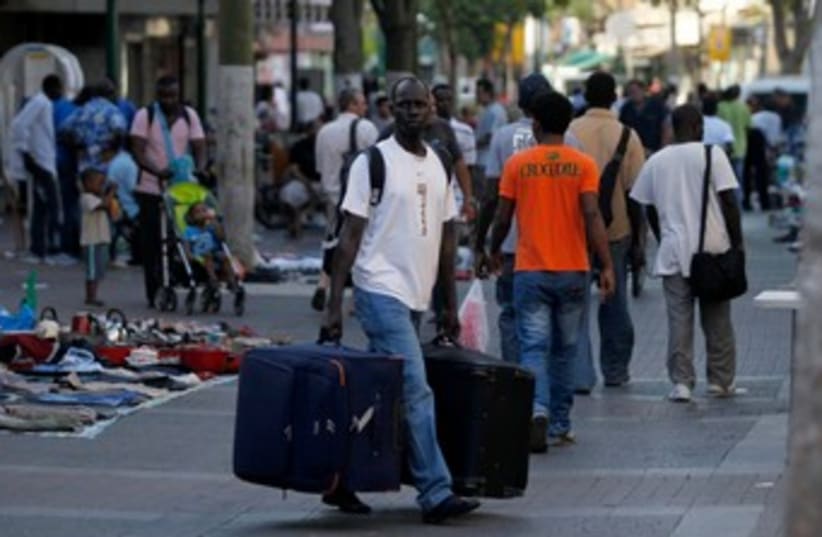Some 2,500 African migrants left the country voluntarily in 2013, including 2,000 Eritreans and Sudanese, the state’s top legal expert on migrant policy said on Wednesday.
With the international media swarming over the protests against the government’s treatment of the more than 50,000 African migrants in the country, the state held an unusual briefing for the press with Daniel Solomon, the legal adviser for the Population and Immigration Border Authority.Solomon gave a comprehensive history of the migrants issue before and during each key point since the African migrants took the stage, and answered a slew of hard-hitting questions.
He acknowledged in very plain language that the state recognized that most of the migrants, who come from Eritrea and Sudan, cannot be legally forced to return to their home countries because of persecution and a lack of diplomatic relations, and said the state honors that principle.But he went on to explain the purpose and legal aspects of the state’s new policy in more detail than is usually provided.Israel has a much larger proportion of Eritreans than most nations facing an Eritrean migrant issue, and this problem is simultaneously compounded by Israel having a smaller overall population in which a group of migrants could be diluted, Solomon said.The new policy is designed to send the message to Africans who came here illegally, but that Israel cannot send back for some of the above technical reasons, that Israel is not encouraging them to stay and will not make staying easy, he said.The policy’s closed detention, open detention and restrictions on working were all part of conveying that message, he indicated.A combination of those actions and offering $3,500 to migrants who leave, even if it did not remove the majority of the migrants, would “ease the pressure” on communities where the migrants have congregated in large numbers (such as south Tel Aviv), he said.Asked why Israel did not use the money being spent to build detention centers instead on joint win-win development projects between the migrants and local citizens, Solomon said that Israel’s responsibility was to take care of the migrants’ “basic needs while they are here.”But he reiterated that Israel’s preference was to prevent more illegal migrants from entering the country and for as many as possible of the ones already here to leave voluntarily.Pressed on how the new policy, which has led 2,500 migrants to leave voluntarily and will house at most 3,500 in open detention, where they are free to leave during the daytime, will address the remaining almost 50,000 migrants, Solomon appeared to imply that this might be a “long-term question,” but that the situation was “dynamic” and that state’s near-term priority should be to try to reduce the number of remaining longterm migrants.Asked repeatedly about the legality and the humanity of the open detention center being located in the desert, Solomon alternatively replied that there were other countries that had their open detention centers outside of cities and on their borders, and said that many Israelis live in the middle of the desert by choice.On moving forward, he said that the state had obtained an agreement with at least one third country to take some of the migrants.However, as with past statements regarding third countries that might take some migrants, he was unwilling to reveal which country or what incentives Israel was providing it.Solomon did say that the initial agreement was to take “hundreds” of migrants, with “potential hopes for taking more” eventually.He declined to predict whether the new policy would pass muster before the High Court of Justice, saying only “I hope so.”On the High Court’s annulling the previous migrant policy in mid-September 2013, he implied that the court would not have acted if the state’s new Sinai fence had not already stopped the flow of migrants.In other words, he implied that the court was more willing to press the state because part of the state’s policy had already succeeded in reducing the scope of the migrant problem.Solomon dismissed the issue of whether there would be problems in sending back South Sudanese migrants in light of the civil war there (since, prior to the war, the High Court said migrants could be returned there), noting that most South Sudanese migrants had already been sent back and so the state was less concerned about the small number who stayed.Solomon reminded the press that almost the entire debate involves one aspect of the state’s migrant policy, known as amendment four to the Prevention of Infiltration Law.Finally, it appeared that conflict with the migrants may only escalate in the near future, as Solomon said that it was possible that some migrants would be arrested if they did not respond to their being summoned to the open detention center late this month.